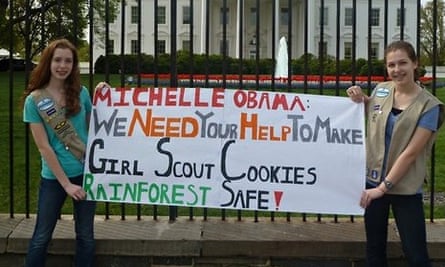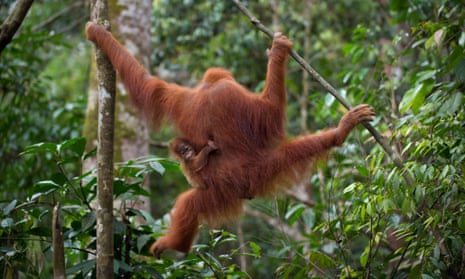In a month saturated with dispiriting reports of recent human atrocity – the vile slaughter at a Nigerian school, the nuclear-winter-style pollution in China, the killing of an unarmed refugee in an Australian detainment camp – one story flickers in the gloom as a happy candle of human potential.
The cereal giant Kellogg has signed up to some of the toughest environmental standards in the world in regards to its sourcing of palm oil. Used in many of Kellogg’s products – including the iconic breakfast indulgence, Pop Tarts – palm oil is used in roughly half of all packaged foods found on US supermarket shelves, and is now a $50bn global industry. Increasing demand for the ingredient has led to a massive expansion of palm oil plantations and in both Malaysia and Indonesia, which has had a devastating impact on the habitat of the endangered orangutan and Sumatran tiger. It’s estimated by environmental organisations that 30,000 square miles of rainforest has been burned to clear land for plantations.
According to Associated Press, suppliers will now be asked to trace their palm oil to plantations that have been verified independently as complying with the law and meeting standards for protecting the environment. It’s a result that must bring AP-reading orangutans and Sumatran tigers no small amount of existential relief, but the decision alone is not the only good news story.
The flickering candle lit by Kellogg’s action is that the enormous and influential food corporation admitted that it changed its policy as a response to years campaigning from green groups, who rallied in celebration at the announcement. The decision brings Kellogg’s practices into line with those already adopted by fellow treat-producer, Girl Scout Cookies, two years ago. The supplier of 200m cookie boxes sold in the US annually, their own ethical policies were in part shaped by years of campaigning from two persistent teenage girls.

Girl Scouts Madison Vorva and Rhiannon Tomtishen were only 10 years old when an assignment to research the endangered orangutan revealed both the environmental cost of palm-oil production and the use of the product in the cookies made and sold by their own organisation. Horrified that use of the product contradicted the Girl Scout code of making the world a better place, the girls formed a campaign group called Project ORANGS to raise awareness, and began letter-writing. Six years later, they were still lobbying - and standing outside the White House with banners, beseeching Michelle Obama’s support for their campaign. They gained backing from the Union of Concerned Scientists, Girl Scout Cookies did change their policy, and the girls earned a “Rainforest Hero” award from the UN for their efforts.
Their dogged persistence – which endured over the entire course of their secondary education – cannot and should not be miraculised as the sole driver of the Kellogg’s decision. But what is significant is that the organic activism of two motivated young people occurred in concert with the efforts of other activist groups, campaign organisations and those individuals persuaded to contribute even just on a symbolic level to an argument for change that eventually spoke to the reason of decision-makers. Everyone, from the person who signed a presented petition, to the girls who took direct action in a visual protest at the White House, to those directly lobbying company management, had a part to play.
There is more change required of course, and whether the orangutan will survive or whether its destruction has merely been delayed for a little longer is an open question. But the simple point – one that can never be repeated enough – is that activism works, even symbolic action is yet action, and all efforts are worthwhile.
As a young student politician, I was once told that there are three rules to successful campaigning: talk to people, talk to people, talk to people. It seems ridiculous to need to reassert this in 2014, but in the midst of Uganda passing homophobia into law, continued attacks on free speech in Russia and - let us mention it again - the forced internment of and institutionalised cruelty towards asylum-seekers in Australia, it’s a lesson that the Kellogg’s decision proves is worth heeding.
As if someone else, something else or an incredible alien machine is going to land and sort out the world’s problems, Russell Brand blithely encourages electoral apathy, and in Australia a chorus of professional pooh-poohers have sought to make cultural mileage out of a “campaign against campaigns” decrying everything from LGBT pride “rainbow crossings” to breast cancer awareness to independent electoral movements. All this ideologically vague and cynical social discouragement achieves is the affirmation a destructive status quo.
In the fight for reason, I choose the side with the letter-writing, banner-hurling teenage girls. They’re the ones, at very least, with better biscuits.

